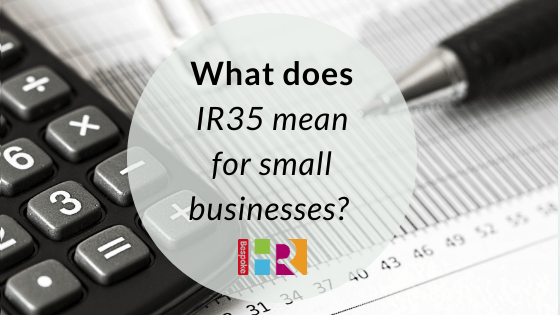Businesses employing freelance contractors have to determine whether they are freelance or could be classed as full-time employees. We explain what IR35 means for small business and IR35 small company exemption.
IR35 is driven by HMRC and is an anti-tax avoidance provision aiming to stop tax and NI avoidance by identifying freelance contractors who have full time positions within a business and therefore are, but for their label of contractor, employees.
Although IR35 has been around since 2000, research has shown that many small businesses still have limited understanding. Here’s our quick guide and what you need to do next. Please be aware employment status is a notoriously complex area and this blog post is only a guide and is not to be regarded as a substitute for consultation with one of our team, since every case will ultimately turn on its own particular facts and circumstances.
What does IR35 mean for small businesses?
If a contractor is operating his or her business through an intermediary (such as a limited company / personal service company) but for that intermediary, they would be an employee, then IR35 kicks in.
- Public sector: if the contract is in the public sector it’s up to the client to determine whether IR35 applies. If it does, then the contractor will need to the correct deductions for tax and National Insurance contributions will need to be made and remitted directly to HMRC on behalf of the worker.
- Private sector: currently in this sector the rules state that the intermediary will need to make extra payment to cover the additional tax and NI that the HMRC would usually receive from an employee’s wages. However, from April it will now be down to the client to determine whether the contractor falls within IR35. Previously this was up to the worker’s personal service company.
IR35 small company exemption
However, an important caveat is that the IR35 rules don’t apply to those businesses classified as ‘small’ and they do not need to declare the status of contractors. In order to fall into this category, the business needs to meet two or more of the following (during a 12-month period):
- Turnover – not more than £10.2 million
- Balance sheet total – no more than £5.1million
- Number of employees – no more than 50
What to do next if you’re unsure whether IR35 applies to your business
Any contractors engaged by small businesses will continue to operate with the IR35 rules as they currently stand (i.e. the responsibility for determining their employment status lies with them and not the client).
If your business is not deemed as ‘small’ then the steps to follow are:
- Conduct an audit of your contractors
Look at how many contractors you employ, in which areas of the business and what they cover. Determine their hours and roles. If you employ contractors through an agency (for example a recruitment firm) then engage with them regarding the investigations they make into IR35 compliance.
- Determine the status of your contractors
Do this on a case-by-case basis, looking at each contractor individually to determine whether they fall in or outside of the IR35 rules. You will need to establish, amongst other things, whether:
- They have the right to provide a substitute for their work
- They don’t work under the direct control of the company
- They are not obligated to carry out the work
We would also recommend reviewing all of the contracts for your freelancers to check that they fall within inside or outside of IR35.
You can also use the government’s tax calculator.
- Prepare an SDS Statement
This is a comprehensive statement that follows an IR35 assessment and declares the contractor’s deemed employment status (for tax purposes) and provides the reasons for reaching this conclusion. However, there is no specific guidance available on what this should look like. These tend to be one-page summaries with details of contractor engagement and evidence of the process used to conclude the final tax status. We can assist in drafting these if required.
If you’re still confused as to how IR35 will impact your business, get in touch to speak to one of our consultants who can explain or read the government guidance on IR35 off-payroll working.
Receive HR updates
Sign up for our monthly newsletter.
Free HR advice
Book a 15 min call with our HR consultants.
HR Services
Guidance on how to get HR support for your business.
